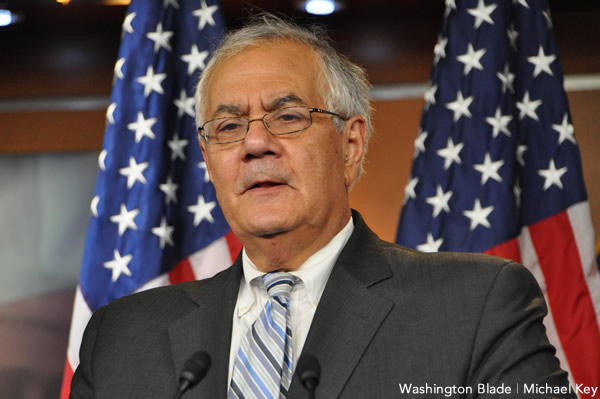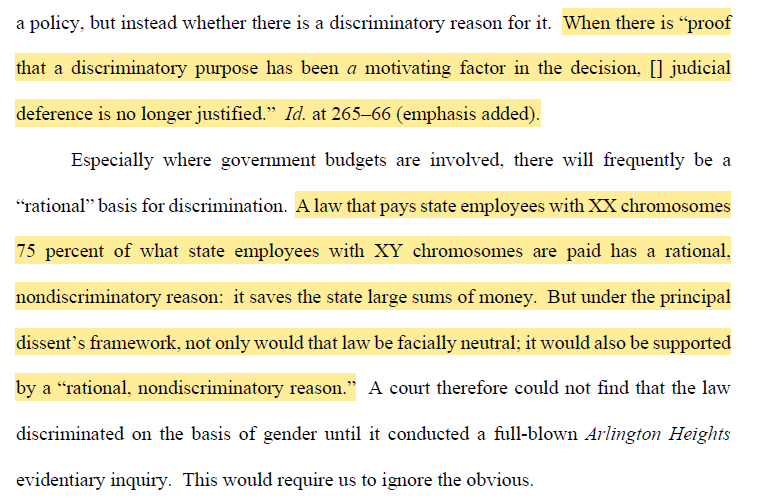National
Will Dems include marriage equality in platform?
Several voting members support adding language
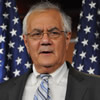
The question of whether the Democratic Party platform will include an endorsement of same-sex marriage has reemerged after the naming of committee members who’ll write the document.
The Washington Blade solicited responses from each member of the platform drafting committee — both voting and non-voting members — to determine if they’d support including an endorsement of marriage equality in the platform with the exception of Tom Wheeler, who couldn’t be reached for comment.
Three voting members — Carlos Odio, a Latino Democratic activist, Donna Harris-Aikens, the National Education Association’s director of policy and practice, and NARAL Pro-Choice America President Nancy Keenan — went on the record saying they’d unequivocally back such language, as did two non-voting members — Massachusetts Gov. Deval Patrick and Democratic National Committee Secretary Alice Germond — while others had different responses and the majority had no response at all.
Last week, the Democratic National Committee announced the names of the 15 people who’ll serve on the platform drafting committee, which will create the platform defining the principles of the Democratic Party over the course of the next four years during the second term of office that President Obama is seeking.
The platform drafting committee, which will be chaired by former Ohio Gov. Ted Strickland, includes Democrats ranging from high-profile public officials, to scholars, to leaders of non-profit organizations. Among them is Rep. Barney Frank (D-Mass.), the longest-serving openly gay member of Congress who announced his planned retirement as a lawmaker late last year.
Other notables include Keenan, Rep. Barbara Lee (D-Calif.), and Philadelphia Mayor Michael Nutter. Serving as ex-officio members, or non-voting members, are Patrick, Germond and Wheeler.
The first publicly scheduled meeting for the group is a national hearing during the weekend of July 27 in Minneapolis, Minn., where the committee will hear public presentations. The committee will then meet to draft the platform which will ultimately be used as a working document by the full platform committee chaired by Newark Mayor Cory Booker and retired Lt. Gen. Claudia Kennedy, the first female to reach the rank of three-star general in the Army. Veteran political consultant Andy Grossman has been named as the DNC’s national platform director.
The full Platform Committee will convene at a meeting during the weekend of Aug. 10 in Detroit where members will discuss the draft platform and have the opportunity to submit new proposed amendments, which need approval by a majority of the committee voting and present for passage. The platform will then be delivered to convention delegates in Charlotte.
Odio, who served as deputy Latino vote director for the 2008 Obama campaign and as a liaison for Latino leaders at the White House Office of Political Affairs, said he’ll “absolutely” advocate for a marriage equality plank in the Democratic Party platform.
“I look forward to working with the other members of the committee to draft a platform that, like the president and the party, are on the right side of history on this and other important issues,” Odio said.
Odio is now director of special projects at the New Organizing Institute, an organization that facilitates for social justice through grassroots and online activism.
Miguel Gonzales, an NEA spokesperson, confirmed that Harris-Aikens would similarly support the idea of including marriage equality in the platform on behalf of NEA without providing a direct statement from her.
Similar statements came from the two non-voting members of the panel. Patrick expressed support for a marriage equality plank in a statement delivered to the Blade in April that has previously gone unpublished.
“Like the President, I believe people should come before their government as equals,” Patrick said. “In Massachusetts, that has meant that people can marry whomever they love. I am proud that marriage equality is the law of our Commonwealth and appreciate that other states are moving in that direction. While I do not believe that marriage is or ought to be the subject of federal law, I support the proposed plank as an expression of human rights for which the Democratic Party stands.”
Kevin Harris, a DNC spokesperson, said Germond is similarly in favor of the language even though she doesn’t have a vote in the platform drafting process.
“Alice supports a marriage equality plank to the platform,” Harris said. “While she does not have a vote on either the drafting or the Platform Committee, she will make her views known where appropriate.”
Keenan also sent a supportive statement to the Blade.
“I strongly support marriage equality and look forward to working with the other members of the committee on a platform that reflects President Obama’s and the party’s views on this and other important issues,” Keenan said.
Keenan added that the process for drafting the platform has just begun and will take time over the coming weeks.
“President Obama has made his support for marriage equality very clear,” Keenan said. “We are beginning the nuts and bolts part of the committee and we will manage details with this the same way we will all other issues over the course of the next few weeks.”
Spokespersons for the two members of Congress on the platform drafting committee — Frank and Lee — responded by saying they have no comment at this time on whether they’ll advocate for a marriage equality plank.
Eric Orner, a Frank spokesperson, said the lawmaker, who earlier this month wed his partner, Jim Ready, said the Massachusetts Democrat isn’t yet ready to speak about marriage equality in the platform.
“Barney has no comment on the topic right now, but asked me to tell you that he’d glad to talk at some point closer to the convention,” Orner said. “He’s still familiarizing himself with issues that may be raised in regard to the party platform.”
In an April interview with the Blade, Frank expressed lukewarm support for the idea of marriage equality in the Democratic Party platform, saying he “would like it,” but thought support for repeal of the Defense of Marriage Act would be more important for the platform.
“The only federal question is DOMA,” Frank said. “The federal government doesn’t have a rule about marriage or not, so I would want there to be a plank that says, ‘We respect the right of states to make this decision.’ I think what’s important from the federal standpoint is to go out against DOMA.”
Similarly, Julie Little Nickson, Lee’s chief of staff, said her boss has no comment on the issue — even though ThinkProgress earlier this month named her among 11 “most pro-gay” U.S. House members.
“We are not commenting on these issues for now, but Barbara will be happy to discuss with you when we get closer to the convention,” Nickson said.
A nuanced response came from full committee chair Kennedy, who noted the process for drafting the platform is very open and encourages public comment.
“Personally, I am progressive on LGBT issues,” Kennedy said. “But the specifics on the language on marriage equality — not yet teed up for the drafting committee, I don’t think.”
Kennedy didn’t respond to a follow-up email to clarify whether she personally supports the idea of a marriage equality plank in the Democratic Party platform.
LGBT advocacy groups, led by the New York-based Freedom to Marry, have been pushing for the inclusion of a plank endorsing same-sex marriage — an idea that has received support from many Democrats, including House Minority Leader Nancy Pelosi (D-Calif.), U.S. Senate candidates Tammy Baldwin and Elizabeth Warren, four former Democratic National Committee chairs and 22 U.S. senators.
Evan Wolfson, president of Freedom to Marry, pledged to work with committee members to attain the goal of a marriage-equality inclusive platform this fall and predicted the efforts would be successful.
“We are continuing to work for a freedom to marry platform plank, reflecting the support of an overwhelming majority of Democrats and substantial majority of independent voters, and fully expect that the committee members and ultimately the party will support and adopt a freeedom to marry plank,” Wolfson said. “We look forward to working closely with them and other Democratic leaders.”
A DNC staff person, speaking on condition of anonymity, similarly expected that the platform would address marriage equality in some way now that President Obama has expressed support for same-sex marriage. The staff person said he believes all 15 members of the platform drafting committee supports marriage equality.
“It goes without saying there will be some sort of marriage equality plank included in the platform,” the staffer said.
A list of those involved with the Democratic platform committee follows:
Platform Drafting Committee
Former U.S. Rep. Tony Coelho
Tino Cuellar, attorney and official in Clinton and Obama administrations
Rep. Barney Frank
Donna Harris-Aikens, National Education Association’s Education director of policy and practice
Colin Kahl, former deputy assistant secretary of defense for the Middle East
Nancy Keenan, NARAL Pro-Choice America President
Heather Kendall Miller, staff attorney for Native American Rights Fund
Thea Lee, policy director and chief international economist at the AFL-CIO
Rep. Barbara Lee
Susan Ness, former member of the Federal Communications Commission
Philadelphia Mayor Michael Nutter
Carlos Odio, Latino Democratic activist
former U.S. Rep. Robert Wexler
Christen Young, associate policy director for Health Care with the Obama campaign
Ex-Officio Platform Drafting Committee Members
Massachusetts Gov. Deval Patrick
DNC Secretary Alice Germond
Tom Wheeler
Full Platform Committee Chairs
Newark Mayor Cory Booker
Retired Lt. Gen. Claudia Kennedy
National Platform Director
Andrew Grossman, veteran political consultant
Federal Government
4th Circuit rules gender identity is a protected characteristic
Ruling a response to N.C., W.Va. legal challenges

BY ERIN REED | The 4th U.S. Circuit Court of Appeals ruled Monday that transgender people are a protected class and that Medicaid bans on trans care are unconstitutional.
Furthermore, the court ruled that discriminating based on a diagnosis of gender dysphoria is discrimination based on gender identity and sex. The ruling is in response to lower court challenges against state laws and policies in North Carolina and West Virginia that prevent trans people on state plans or Medicaid from obtaining coverage for gender-affirming care; those lower courts found such exclusions unconstitutional.
In issuing the final ruling, the 4th Circuit declared that trans exclusions were “obviously discriminatory” and were “in violation of the equal protection clause” of the Constitution, upholding lower court rulings that barred the discriminatory exclusions.
The 4th Circuit ruling focused on two cases in states within its jurisdiction: North Carolina and West Virginia. In North Carolina, trans state employees who rely on the State Health Plan were unable to use it to obtain gender-affirming care for gender dysphoria diagnoses.
In West Virginia, a similar exclusion applied to those on the state’s Medicaid plan for surgeries related to a diagnosis of gender dysphoria. Both exclusions were overturned by lower courts, and both states appealed to the 4th Circuit.
Attorneys for the states had argued that the policies were not discriminatory because the exclusions for gender affirming care “apply to everyone, not just transgender people.” The majority of the court, however, struck down such a claim, pointing to several other cases where such arguments break down, such as same-sex marriage bans “applying to straight, gay, lesbian, and bisexual people equally,” even though straight people would be entirely unaffected by such bans.
Other cases cited included literacy tests, a tax on wearing kippot for Jewish people, and interracial marriage in Loving v. Virginia.
See this portion of the court analysis here:
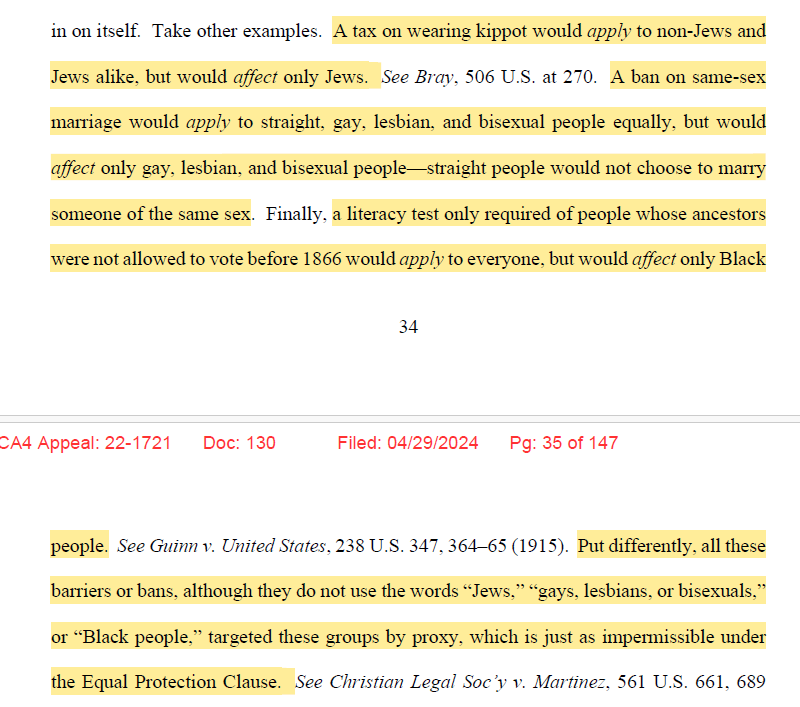
Of particular note in the majority opinion was a section on Geduldig v. Aiello that seemed laser-targeted toward an eventual U.S. Supreme Court decision on discriminatory policies targeting trans people. Geduldig v. Aiello, a 1974 ruling, determined that pregnancy discrimination is not inherently sex discrimination because it does not “classify on sex,” but rather, on pregnancy status.
Using similar arguments, the states claimed that gender affirming care exclusions did not classify or discriminate based on trans status or sex, but rather, on a diagnosis of gender dysphoria and treatments to alleviate that dysphoria.
The majority was unconvinced, ruling, “gender dysphoria is so intimately related to transgender status as to be virtually indistinguishable from it. The excluded treatments aim at addressing incongruity between sex assigned at birth and gender identity, the very heart of transgender status.” In doing so, the majority cited several cases, many from after Geduldig was decided.
Notably, Geduldig was cited in both the 6th and 11th Circuit decisions upholding gender affirming care bans in a handful of states.
The court also pointed to the potentially ridiculous conclusions that strict readings of what counts as proxy discrimination could lead to, such as if legislators attempted to use “XX chromosomes” and “XY chromosomes” to get around sex discrimination policies:
Importantly, the court also rebutted recent arguments that Bostock applies only to “limited Title VII claims involving employers who fired” LGBTQ employees, and not to Title IX, which the Affordable Care Act’s anti-discrimination mandate references. The majority stated that this is not the case, and that there is “nothing in Bostock to suggest the holding was that narrow.”
Ultimately, the court ruled that the exclusions on trans care violate the Equal Protection Clause of the Constitution. The court also ruled that the West Virginia Medicaid Program violates the Medicaid Act and the anti-discrimination provisions of the Affordable Care Act.
Additionally, the court upheld the dismissal of anti-trans expert testimony for lacking relevant expertise. West Virginia and North Carolina must end trans care exclusions in line with earlier district court decisions.
The decision will likely have nationwide impacts on court cases in other districts. The case had become a major battleground for trans rights, with dozens of states filing amicus briefs in favor or against the protection of the equal process rights of trans people. Twenty-one Republican states filed an amicus brief in favor of denying trans people anti-discrimination protections in healthcare, and 17 Democratic states joined an amicus brief in support of the healthcare rights of trans individuals.
Many Republican states are defending anti-trans laws that discriminate against trans people by banning or limiting gender-affirming care. These laws could come under threat if the legal rationale used in this decision is adopted by other circuits. In the 4th Circuit’s jurisdiction, West Virginia and North Carolina already have gender-affirming care bans for trans youth in place, and South Carolina may consider a similar bill this week.
The decision could potentially be used as precedent to challenge all of those laws in the near future and to deter South Carolina’s bill from passing into law.
The decision is the latest in a web of legal battles concerning trans people. Earlier this month, the 4th Circuit also reversed a sports ban in West Virginia, ruling that Title IX protects trans student athletes. However, the Supreme Court recently narrowed a victory for trans healthcare from the 9th U.S. Circuit Court of Appeals and allowed Idaho to continue enforcing its ban on gender-affirming care for everyone except the two plaintiffs in the case.
Importantly, that decision was not about the constitutionality of gender-affirming care, but the limits of temporary injunctions in the early stages of a constitutional challenge to discriminatory state laws. It is likely that the Supreme Court will ultimately hear cases on this topic in the near future.
Celebrating the victory, Lambda Legal Counsel and Health Care Strategist Omar Gonzalez-Pagan said in a posted statement, “The court’s decision sends a clear message that gender-affirming care is critical medical care for transgender people and that denying it is harmful and unlawful … We hope this decision makes it clear to policy makers across the country that health care decisions belong to patients, their families, and their doctors, not to politicians.”
****************************************************************************

Erin Reed is a transgender woman (she/her pronouns) and researcher who tracks anti-LGBTQ+ legislation around the world and helps people become better advocates for their queer family, friends, colleagues, and community. Reed also is a social media consultant and public speaker.
******************************************************************************************
The preceding article was first published at Erin In The Morning and is republished with permission.
National
GLSEN hosts Respect Awards with Billy Porter, Peppermint
Annual event aims to ‘inspire a lot of people to get active’

GLSEN will host its annual Respect Awards April 29 in New York, with guests including Miss Peppermint and Billy Porter.
Respect Awards director Michael Chavez said that the event will be moving.
“It will inspire a lot of people to get active and take action in their own communities and see how much more work there is to do, especially with all of the harmful things happening,” he said.
At the event, they will recognize the Student Advocate of the Year, Sophia T. Annually, GLSEN recognizes a student from around the country who is impacting their community.
“Sophia is doing incredible work advocating for inclusive sex education that is LGBTQ+ affirming, working with Johns Hopkins University to implement curriculum.” Chavez said.
Chavez calls the students that attend the Respect Awards the “biggest celebrities” of the evening.
“It is really important for the adults, both the allies and the queer folks, to hear directly from these queer youth about what it’s like to be in school today as a queer person,” he said.
GLSEN is a queer youth advocacy organization that has been working for more than 30 years to protect LGBTQ youth.
“GLSEN is all hands on deck right now, because our kids are under direct attack and have been for years now,” said actor Wilson Cruz.
Cruz is the chair of GLSEN’s National Board, which works to fundraise and strategize for the organization.
“I think we are fundamental to the education of LGBTQ students in school,” he said. “We advocate for more comprehensive support at the local, national, and federal levels so our students are supported.”
Chavez is one of the students that was impacted by this work. He led his school’s GSA organization and worked with GLSEN throughout his youth.
Cruz said Chavez is doing what he hopes today’s GLSEN students do in the future, which is pay the work forward.
“There’s nothing more powerful than people who have experienced the work that GLSEN does and then coming back and allowing us to expand on that work with each generation that comes forward,” he said.
Florida
Homeless transgender woman murdered in Miami Beach
Andrea Doria Dos Passos attacked while she slept
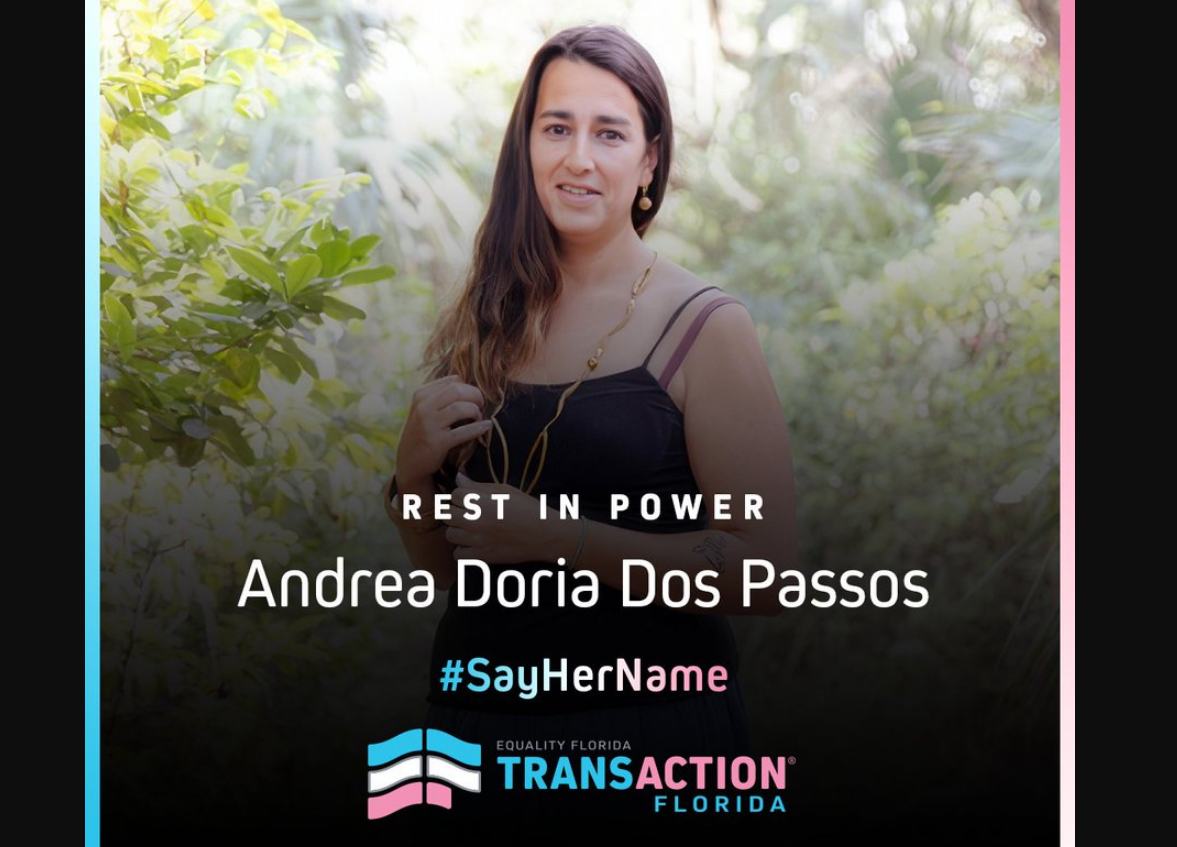
Gregory Fitzgerald Gibert, 53, who was out on probation, is charged with the second-degree murder of 37-year-old Andrea Doria Dos Passos, a transgender Latina woman who was found deceased in front of the Miami Ballet company facility by a security guard this past week.
According to a Miami Beach Police spokesperson the security guard thought Dos Passos was sleeping in the entranceway around 6:45 a.m. on April 23 and when he went to wake her he discovered the blood and her injuries and alerted 911.
She was deceased from massive trauma to her face and head. According to Miami Beach police when video surveillance footage was reviewed, it showed Dos Passos lying down in the entranceway apparently asleep. WFOR reported: In the early morning hours, a man arrived, looked around, and spotted her. Police said the man was dressed in a black shirt, red shorts, and red shoes.
At one point, he walked away, picked up a metal pipe from the ground, and then returned. After looking around, he sat on a bench near Dos Passos. After a while, he got up and repeatedly hit her in the head and face while she was sleeping, according to police.
“The male is then seen standing over her, striking her, and then manipulating her body. The male then walks away and places the pipe inside a nearby trash can (the pipe was found and recovered in the same trash can),” according to the arrest report.
Police noted that in addition to trauma on her face and head, two wooden sticks were lodged in her nostrils and there was a puncture wound in her chest.
Victor Van Gilst, Dos Passos’s stepfather confirmed she was trans and experiencing homelessness.
“She had no chance to defend herself whatsoever. I don’t know if this was a hate crime since she was transgender or if she had some sort of interaction with this person because he might have been homeless as well. The detective could not say if she was attacked because she was transgender,” said Van Gilst.
“She has been struggling with mental health issues for a long time, going back to when she was in her early 20s. We did everything we could to help her. My wife is devastated. For her, this is like a nightmare that turned into reality. Andrea moved around a lot and even lived in California for a while. She was sadly homeless. I feel the system let her down. She was a good person,” he added.
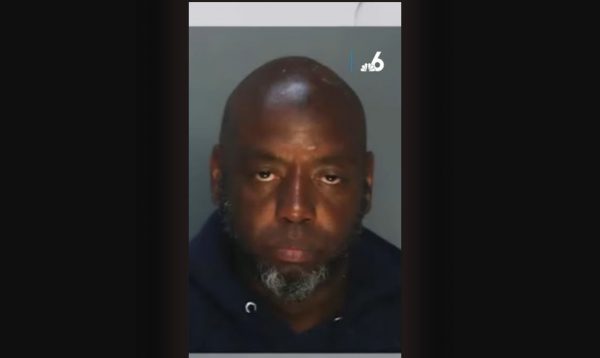
The Miami Police Department arrested Gibert, collected his clothing, noting the red shorts were the same type in the video and had blood on them. Blood was also found on his shoes, according to police. He was taken into custody and charged.
“The suspect has an extensive criminal record and reportedly was recently released from custody on probation for prior criminal charges. Police apprehended the suspect in the city of Miami and the investigation is currently ongoing. This case is further evidence that individuals need to be held accountable for prior violent crimes for the protection of the public. We offer our sincere condolences to the family and friends of the victim,” Miami Beach Mayor Steve Meiner said in a statement.
Joe Saunders, senior political director with LGBTQ rights group Equality Florida, told the Miami Herald that “whenever a transgender person is murdered, especially when it is with such brutality, the question should be asked about whether or not this was a hate-motivated crime.”
-

 District of Columbia5 days ago
District of Columbia5 days agoCatching up with the asexuals and aromantics of D.C.
-

 South America5 days ago
South America5 days agoArgentina government dismisses transgender public sector employees
-

 Mexico4 days ago
Mexico4 days agoMexican Senate approves bill to ban conversion therapy
-

 Advice4 days ago
Advice4 days agoShould I divorce my husband for the hot new guy in our building?

